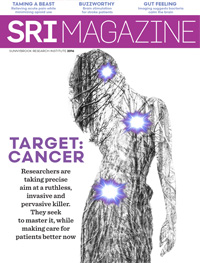Surveying new territory: physician-assisted death and amyotrophic lateral sclerosis

With the federal government this year releasing draft legislation on Supreme Court-sanctioned physician-assisted death, the issue is on many people’s minds. Arguably, this is no truer than for doctors, many of whom are already fielding questions from their patients. Dr. Lorne Zinman, a clinician-scientist in the Hurvitz Brain Sciences Program at Sunnybrook Research Institute, was the senior author of a survey of health professionals who care for people with amyotrophic lateral sclerosis (ALS) to find out what they think about it. Zinman is the head of the ALS clinic at Sunnybrook, which is the largest such in Canada. He and his colleagues, led by Sunnybrook neurologist Dr. Agessandro Abrahao, asked doctors and allied health professionals from the 15 academic ALS centres across Canada for their thoughts on the court ruling, how willing they were to participate in physician-assisted death and about the process for it.
Of the 231 respondents, 64% of doctors and 80% of allied health professionals agreed with the ruling. Most—77% of doctors and 81% of allied health professionals—agreed that someone with moderate to severe ALS and physical and emotional suffering would qualify for physician-assisted death. Eight percent of doctors and 2% of other care providers said that no patient with ALS should be eligible.
When it came to the process, most said they would not provide a lethal prescription or injection. Even among doctors who support physician-assisted death, only 26% were willing to write a prescription for a lethal dose of an oral medication in moderate-stage ALS. In severe-stage ALS, 34% were willing to prescribe a lethal dose of oral drugs; 31% said they were willing to give a lethal injection.
Most said they would prefer the patient get a second opinion from an ALS expert to confirm eligibility, have a psychiatric assessment, make the request twice at least 15 days apart and then be referred to a third party for administration of the lethal drug or injection. Most also said they felt unprepared to deal with the new legislation, and advocated for training and guidelines. In their conclusion, the authors noted that it was imperative to include the perspectives of patients with ALS and their caregivers as legislation moves ahead.

Read text-only version of above infographic
On Feb. 6, 2015, the Supreme Court of Canada unanimously struck down the prohibition of physicianassisted dying (PAD). Here is what doctors and allied health professionals (AHP) from ALS centres across Canada think about the ruling and PAD.
64% of doctors and 80% of AHP agree with the ruling
77% of doctors and 81% of AHP agree that someone with moderate to severe ALS would qualify for PAD
In moderate-stage ALS: 26% of doctors would be willing to prescribe a lethal dose of oral drugs
In severe-stage ALS: 31% of doctors would be willing to administer a lethal injection
34% of doctors would be willing to prescribe a lethal dose of oral drugs
8% of doctors and 2% of AHP say no patient with ALS should be eligible for PAD



